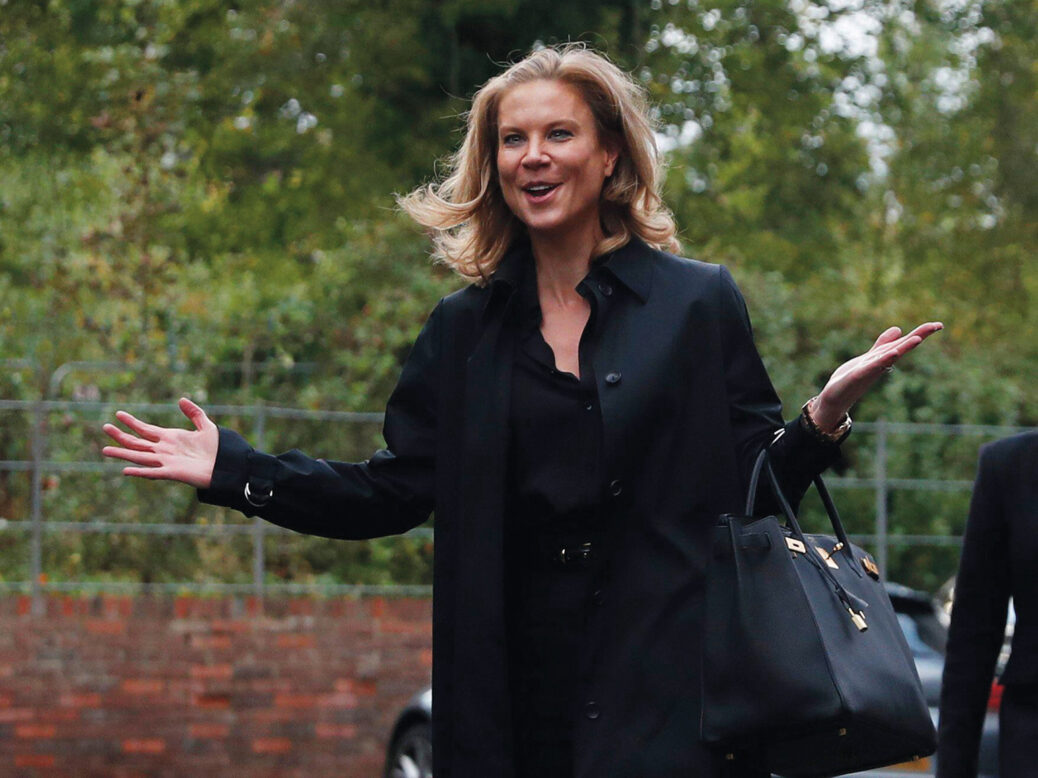
In 2017 Theresa May travelled to Riyadh with Xavier Rolet, then the head of the London Stock Exchange, to persuade Aramco, the Saudi Arabian state-owned oil giant, to list its shares in London. In spite of the PM’s efforts, the deal fell through. Perhaps they should have sent Amanda Staveley, who has spent four years courting Newcastle United on behalf of a Saudi-led consortium. The two deals faced similar challenges – regulatory hurdles, concerns about the Saudi government’s influence on a British institution, protests from human rights campaigners – but Staveley’s success as a diplomat-capitalist meant that, on 7 October, the long-awaited Newcastle takeover went through.
Amanda Staveley seems always to have had a close relationship with money. Born in Yorkshire in 1973 to a wealthy family, she spent much of her youth with her grandparents, who ran a chain of betting shops. She studied at Cambridge but left before completing her degree, suffering from depression and anorexia. After working in a restaurant, she raised the money to buy her own, and turned the Stocks country club outside Cambridge into a success through a punishing regime of 4am starts and doing almost everything, from waiting tables to accounting, herself.
This combination of independence and ambition has characterised her career. While running her restaurant, Staveley travelled regularly to London for financial training. Stocks was close to the Newmarket racecourse, and she began to make contacts among the elite; she dated Prince Andrew, and reportedly turned down a marriage proposal from him. Her next business venture, a conference centre, foundered when her partner company fell into administration, leaving her almost penniless. Finding herself suddenly without accommodation, she spent one night sleeping in a doorway; inevitably, it was the doorway of a London bank.
Having moved to Dubai to start again with a new company, PCP Capital Partners, Staveley returned to form a very different relationship with the City of London. In 2008, aged 35, she brokered a £3.5bn investment in Barclays. Amid the financial crisis, RBS and Lloyds raised tens of billions from public funds. Barclays sought to remain free of state ownership, but to meet the government’s new capital requirements it still needed huge investment.
[see also: Leader: The great British sell-off]
Roger Jenkins, the former head of Barclays’ Middle Eastern business, had someone who could help: he had befriended the then prime minister of Qatar, Sheikh Hamad bin Jassim bin Jaber al-Thani, on holiday in Sardinia in 2007. Through the Qatar Investment Authority, Sheikh Hamad invested £2.3bn into Barclays.
But this was not enough, and Staveley had her own contact in an oil-rich nation, having worked with Sheikh Mansour bin Zayed al-Nahyan, of the Abu Dhabi royal family, on his takeover of Manchester City. She saw an opportunity for Abu Dhabi, and herself, in Barclays. The £3.5bn investment she brokered made Sheikh Mansour the largest shareholder in Britain’s second biggest bank (by market capitalisation) in 2008. PCP made a reported £40m on the deal; Abu Dhabi would eventually sell its interest for a profit of £1.3bn.
Someone acquainted with Staveley described her as highly intelligent, determined and an expert in corporate finance. Her success as a Western businesswoman in the private and almost exclusively male realm of Middle Eastern business, they said, was the result of a detailed understanding of money flows and the intricacies of financing. “People underestimate her,” they said.
Barclays executives appear to have done just that. Last year, Staveley launched a £1.6bn lawsuit against Barclays claiming the bank had unfairly given preferential terms to Qatar, meaning PCP lost out on higher fees. In the transcripts of phone calls later released by the High Court, former Barclays executive Roger Jenkins was recorded as having called Staveley a “tart” and a “dolly bird”. Another executive was separately recorded calling Staveley “thick as shit” and discussing the size of her breasts.
Staveley lost the case and a subsequent appeal, but the judge, Justice David Waksman, described Staveley as a “tough, clever and creative entrepreneur”, and agreed that to some extent, “Barclays’ case sought to disparage her” as “a lightweight and a chancer”.
Another source with experience of Staveley’s work described her as adept at managing perceptions of her business and herself. Newcastle United may test these abilities.
On paper, Newcastle is a good investment for Staveley and Saudi Arabia’s Public Investment Fund, which will own around 80 per cent of shares. The club appears to be in a sound financial position, and while it has low commercial returns for the Premier League, the years of underinvestment that made Mike Ashley a hate figure among fans now represent an opportunity for investment and expansion. As human rights campaigners pointed out when the takeover was announced, the deal also buys a grateful fan base for a repressive state that exerts control through arbitrary imprisonment and execution.
In 2013, two years after her marriage to the British-Iranian financier Mehrdad Ghodoussi, Staveley tested positive for Huntington’s disease, an incurable and ultimately fatal brain condition (she is said to have attended a business meeting after receiving the news). There are probably few situations less medically advisable than being the person between Mohammed bin Salman and thousands of passionate fans, but her prognosis does not seem to have diminished her appetite for stress. With takeovers happening daily – Newcastle is one of more than 120 British companies that have been bought by private equity so far this year – it is very much the season of the dealmaker.
[see also: Newcastle fans back the club’s takeover by Saudi Arabia. Do they bear moral responsibility?]
This article appears in the 13 Oct 2021 issue of the New Statesman, Perfect Storm






